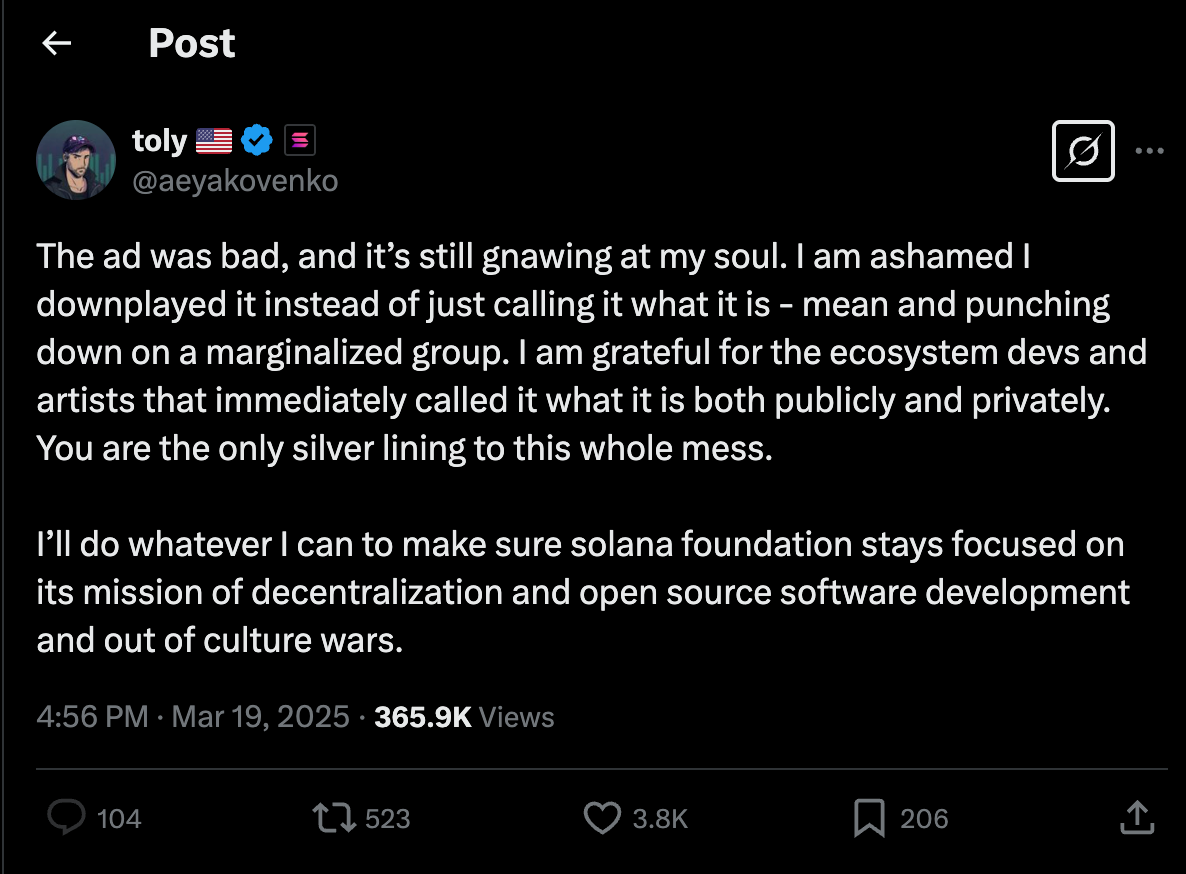Thursday Gist: Solana’s Biggest Crashout This Year So Far......
How a Controversial Ad Sparked Backlash and Forced a Reckoning on Inclusivity
Solana’s latest marketing stunt was meant to grab attention, but not like this. A satirical ad that mocked gender identity sparked outrage across the crypto community, forcing the company to delete the video within hours and issue a rare public apology. Now, the blockchain giant faces a bigger question—can it repair its reputation, or has it alienated the very community that helped build it?
Solana has found itself in the middle of a controversy that has nothing to do with its blockchain technology but everything to do with a marketing misstep. On March 17, Solana’s official X (formerly Twitter) account posted a promotional video titled "America is Back—Time to Accelerate," which quickly racked up over 1.2 million views. The video featured a satirical therapy session in which a man, representing America, wants to focus on innovation and technology. However, his therapist urges him to focus instead on pronouns and gender identity, a portrayal that many viewed as politically divisive and tone-deaf. The backlash was swift, and within just nine hours, Solana deleted the video, but the damage was already done.
The crypto community, known for valuing decentralization and neutrality, did not take kindly to the ad’s messaging. Tyler Bench, Chief Revenue Officer of Tally.xyz, went as far as to call it "the single most toxic piece of content" he had seen in the industry. Others pointed out that Solana’s history of supporting inclusivity, such as its 2020 Black Lives Matter statement, seemed to contradict this latest move. The uproar didn’t just come from casual observers; even key figures in the blockchain space, like Adam Cochran, questioned how the ad could have passed through multiple levels of approval without raising red flags. The backlash underscored an ongoing debate within the crypto world—should blockchain companies take political stances, or should they strictly focus on technology and innovation?
As the criticism mounted, Solana Labs CEO Anatoly Yakovenko took to X on March 19 to issue a public apology. "The ad was bad, and it’s still gnawing at my soul," he admitted, acknowledging the backlash from the community. He praised those within the Solana ecosystem who called out the issue, both publicly and privately, and promised that the company would learn from this misstep. Yakovenko made it clear that Solana would steer clear of cultural and political debates moving forward, refocusing on its core mission—developing decentralized, open-source blockchain solutions. The official Solana X account, which boasts 3.3 million followers, reshared his statement, signaling an attempt to move past the controversy.
However, the fallout from the ad extended beyond just social media outrage. The crypto industry has long been seen as a meritocracy where contributions matter more than identity. Many pointed out that transgender and non-binary developers have played a significant role in blockchain innovation. A 2017 GitHub survey found that 1% of open-source developers identified as transgender and another 1% as non-binary, numbers that far exceed their representation in the general population. Critics like Cochran argued that the ad ignored this reality, instead pushing a divisive message that undermined the industry’s inclusive foundations.
This controversy also comes at a time when Solana has been making headlines for other reasons—its deepening involvement in the meme coin market. Platforms like Pump.fun, which operate on Solana’s blockchain, have been experiencing a surge in activity, with one meme coin reaching a $200 million market cap in just two days. While the project’s financial prospects remain strong, this marketing blunder has put Solana’s branding choices under scrutiny. Moving forward, any promotional efforts from the company will likely be watched more closely to avoid another PR disaster.
All top assets in the Solana ecosystem on CMC
Solana’s quick removal of the ad and Yakovenko’s public apology suggest that the company understands the gravity of the situation. But the broader lesson here is clear: in an industry built on the ideals of decentralization and neutrality, companies must be cautious about wading into cultural debates. Whether Solana can fully recover from this remains to be seen, but one thing is certain—the crypto world never forgets, and reputations in this space can shift as quickly as the markets themselves.
Moving Forward: Lessons Learned
Yakovenko’s pledge to refocus on “open-source software and decentralization” signals a course correction, but trust will take time to rebuild. The episode serves as a cautionary tale for crypto projects: cultural sensitivity is non-negotiable in an industry striving for global adoption. As Solana prepares for its Accelerate conference, its ability to balance innovation with inclusivity will be scrutinized more closely than ever. For the broader crypto space, the takeaway is clear: neutrality isn’t just a technical ideal—it’s a cultural imperative.



